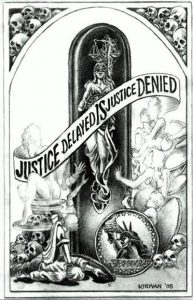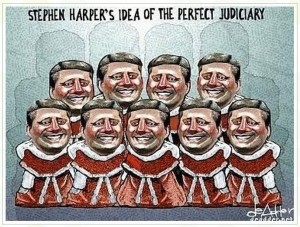
The supreme court of Canada took 12 months to rule in Ernst vs AER on merely a preliminary motion, while taking 9 months in this much more complicated case. The entire top court process, from filing leave to appeal to release of the ruling, took 26 months in my case compared to 18 in this current case.

And with a big stink, the supreme court (via the Parliamentary press gallery) did not request media lock-up in this case, as they did in mine. Why try to lock-up a Canadian citizen’s case (that many in the world were following) against a regulator, but not a corporation’s? Refer to my lawsuit page for more details.
2016 07 12: Klippenstein’s letter to Supreme Court of Canada, Ernst declines consent to the request for media lock-up:
“Jessica Ernst believes that it is better and fairer if the public and all media have equal access to the judgment in this case at the same time”
Note that the court claimed on their docket for my case (snaps on my lawsuit page) that the lock-up was requested in Feb 2016, but the court did not add it to the docket or notify me about it, until 5 months later in July. I checked the docket daily because I expected hanky panky. The court also removed from the docket submissions of support for my case by the citizenry and the Rosebud Hamlet Petition to the Court or did not include them at all, or rejected them by returning them, while including and not removing/rejecting submissions of support by Canada’s largest oil & gas propaganda group, Canadian Association of Petroleum Producers (CAPP) in the Redwater case (which CAPP was not party to).
Canada’s “supreme” court (7/9 judges appointed by the Harper klan) piled trickery, delays, costs and lies in my case. I think to punish me for daring to seek justice for Encana/Ovintiv breaking the law, and the regulators breaking the law and violating my Charter rights to cover-up Encana breaking the law (and, Heavens to Betsy, me refusing to let the court lock up the release of their ruling – which would have cost me a lot more money for no reason but to be mean and unfair).
In the end, the high court knowingly lied in their ruling, ruled against me and all Canadians, damaged our Charter, and violated my guaranteed right under the Charter to seek remedy for my “valid” Charter claim against AER. Petro State “access to justice” by Canada’s top judges affirming what an Alberta lawyer and his wife wrote me last year (added to the home page):
… You’ve proven that oil companies are above the law. Such a hard won victory for you but what a foot hold for others pursuing claims against oil companies in the future. Dragging the dark into light is the work of giants and you did it!
I hope this finds you in good spirits.
Thank you again for staying the line
Deb Macleod
Rick Wyrozub [Alberta lawyer]
***
Emmett Macfarlane@EmmMacfarlane Poli Sci Prof, UWaterloo. Constitutional Law, Public Policy & Cdn Politics. Author & editor of books:
Law is politics people. Never forget.
***


Supreme Court of Canada / Cour suprême du Canada
JUDGMENT TO BE RENDERED IN APPEAL
October 30, 2020
For immediate release
OTTAWA – The Supreme Court of Canada announced today that judgment in the following appeal will be delivered at 9:45 a.m. EST on Thursday, November 5, 2020. This list is subject to change.
PROCHAIN JUGEMENT SUR APPEL
Le 30 octobre 2020
Pour diffusion immédiate
OTTAWA – La Cour suprême du Canada annonce que jugement sera rendu dans l’appel suivant le jeudi 5 novembre 2020, à 9 h 45 HNE. Cette liste est sujette à modifications.
Procureure générale du Québec, et al. c. 9147-0732 Québec inc. (Qc) (38613)
38613 Attorney General of Quebec, Director of Criminal and Penal Prosecutions v. 9147-0732 Québec inc.
(Que.) (Civil) (By Leave)
Charter of Rights – Cruel and unusual treatment or punishment – Application of Charter rights to legal persons – Statement of offence issued against business corporation for carrying out construction work as contractor without holding current licence – Provincial building legislation providing for mandatory minimum fine of $30,843 – Whether legal person can benefit from protection of section 12 of Charter – Canadian Charter of Rights and Freedoms, s. 12 – Building Act, CQLR, c. B‑1.1, ss. 46, 197.1
The respondent, a private company, was issued a statement of offence under the Quebec Building Act for carrying out certain construction work as a contractor without holding a current licence for that purpose. Under s. 197.1 of the Act, the penalty for such an offence is a mandatory fine for a minimum amount that varies depending on who the offender is, that is, whether the offender is a natural person or a legal person. The respondent filed a notice of intention to question the constitutionality of the fine provided for in s. 197.1, arguing that the fine violated its right to be protected against “any cruel and unusual treatment or punishment” under s. 12 of the Canadian Charter of Rights and Freedoms .
At trial, the Court of Québec held that it was not necessary to rule on the issue of the application of s. 12 of the Charter to legal persons, because the minimum fine at issue was at any rate not cruel and unusual. The respondent was found guilty, and a fine of $30,843 was imposed. On appeal, the Quebec Superior Court affirmed that decision and added that legal persons such as the respondent could not benefit from the protection of s. 12 of the Charter . A majority of the Quebec Court of Appeal set aside the decisions of the lower courts and held that s. 12 of the Charter can in fact apply to legal persons. The matter was returned to the trial court to rule on the specific issue of the fine provided for in s. 197.1 of the Act.
38613 Procureure générale du Québec, directeur des poursuites criminelles et pénales c. 9147-0732 Québec inc.
(Qc.) (Civile) (Autorisation)
Charte des droits – Traitements ou peines cruels et inusités – Application des droits énoncés à la Charte aux personnes morales – Constat d’infraction émis contre société commerciale pour avoir entrepris travaux d’entrepreneur et de construction sans détenir licence en vigueur – Loi provinciale sur le bâtiment prévoit amende minimale obligatoire de 30 843 $ – Une personne morale peut-elle bénéficier de la protection de l’article 12 de la Charte ? – Charte canadienne des droits et libertés, art. 12 – Loi sur le bâtiment, RLRQ c. B-1.1, art. 46, 197.1
L’intimée, une société commerciale privée, s’est vu émettre un constat d’infraction en vertu de la Loi sur le bâtiment du Québec, pour avoir entrepris certains travaux d’entrepreneur et de construction sans détenir une licence en vigueur à cette fin. La peine pour une telle infraction prévue à l’art. 197.1 de la Loi est une amende obligatoire dont le montant minimal varie selon l’identité du contrevenant, c.-à-d. s’il s’agit d’une personne physique ou morale. L’intimée dépose un avis de contestation de la validité constitutionnelle de l’amende prévue à l’art. 197.1, alléguant que celle-ci viole son droit de protection contre « tous traitements ou peines cruels et inusités » en vertu de l’art. 12 de la Charte canadienne des droits et libertés .
En première instance, la Cour du Québec conclut qu’il n’était pas nécessaire de se prononcer quant à la question de l’application de l’art. 12 de la Charte aux personnes morales, puisque l’amende minimale en cause n’était pas, de toute façon, cruelle et inusitée. L’intimée est déclarée coupable, et une amende de 30 843 $ est imposée. En appel, la Cour supérieure du Québec confirme cette décision, et ajoute que les personnes morales, comme l’intimée, ne peuvent bénéficier de la protection fournie par l’art. 12 de la Charte . Une majorité à la Cour d’appel du Québec infirme les décisions des instances inférieures et conclut que l’art. 12 de la Charte peut en effet s’appliquer aux personnes morales. Elle retourne le dossier en première instance pour trancher la question précise en ce qui concerne l’amende prévue à l’art. 197.1 de la Loi.
Supreme Court of Canada / Cour suprême du Canada :
email hidden; JavaScript is required
(613) 995-4330
– 30 –
Supreme Court: Can a corporation be subjected to cruel and unusual punishment? by Jennifer Quaid Associate Professor, Civil Law Section, Faculty of Law, L’Université d’Ottawa/University of Ottawa, Jan 26, 2020, The Conversation
Disclosure statement
Jennifer Quaid is affiliated with Transparency International Canada and sits on its legal committee. She currently holds research grants funded by the Social Sciences Research Council of Canada and the Foundation for Legal Research.
Partners
University of Ottawa provides funding as a member of The Conversation CA-FR.
University of Ottawa provides funding as a member of The Conversation CA.
Yes, you read that headline right. As far-fetched as it sounds, the Supreme Court of Canada just heard a case that raises the question of whether the protection against cruel and unusual punishment set out in the Canadian Charter of Rights and Freedoms extends to corporations.
The constitutional challenge could establish a new frontier in sentencing.
The story behind the case is simple.
The accused numbered company, 9147-0732 Québec Inc., is a building contractor convicted of doing construction work without a proper licence, contrary to the Québec Building Code.
At trial, the judge rejected the company’s defence that it had simply made a mistake by billing the work through the “wrong” company. In the construction industry, sub-contracting among different companies run by the same people, often family members, is common.
Prior to sentencing, the company challenged the $30,000 minimum penalty applicable to corporations — about three times the minimum applicable to individuals — as cruel and unusual punishment under Sec. 12 of the Charter, which mandates that no one should be subjected to such punishment.
The trial judge decided that the company’s Charter rights weren’t violated.
The judge then separately ruled that corporations cannot claim protection from cruel and unusual punishment because in Canada and elsewhere, it’s intended to protect people, not companies, from unconscionable, degrading or inhumane treatment. That includes torture or indefinite solitary confinement.
Went to appeal
That second portion of the ruling was appealed to the Superior Court of Québec, which upheld the decision, and then to the Québec Court of Appeal, where the judges split 2-1 in favour of the company.
The two judges ruled that nothing in the Charter section precludes companies from arguing that a mandatory minimum penalty is cruel and unusual punishment.
A key part of their reasoning was that mandatory minimum monetary penalties could lead to fines that cause serious economic harm and even push companies into bankruptcy.
Since that could potentially hurt employees who are at risk of losing their jobs and benefits, it could constitute cruel and unusual punishment, they held.
The two justices pointed to a specific sentencing factor in the Criminal Code that requires a judge to take into account the effect of the sentence on the economic viability of a business entity and the continued employment of its employees. They also cited the new remediation agreement regime, which clearly states that one of the purposes of the regime is to:
“… reduce the negative consequences of the wrongdoing for persons — employees, customers, pensioners and others — who did not engage in the wrongdoing, while holding responsible those individuals who did engage in that wrongdoing.”
In his dissent, the third judge analyzed the history of the protection from cruel and unusual punishment in Canadian and English law (going back to the 1688 Bill of Rights), as well American, European and international human rights conventions.
He concluded that it was inconsistent with the essence of Sec. 12 of the Charter to allow corporations to assert that monetary penalties could constitute cruel and unusual punishment.
He also rejected corporations pointing to potential bankruptcy, and its impact on their employees, as a basis for saying a punishment is cruel and unusual. In his view, this was tantamount to giving corporations the ability to have their cake and eat it too — behave badly in ways that could harm their employees, then use those employees as a shield when penalized.
Corporations have some Charter rights
The question, therefore, of whether the Charter should be interpreted to extend to corporations is complex. And it’s not new; it came up almost immediately after the Charter was enacted.
Courts have found that corporations do have the benefit of some Charter rights, like those protecting against unreasonable search and seizure, the right to trial within a reasonable time and the presumption of innocence.
Corporations are also able to challenge unconstitutional laws that violate their rights.
Over time, provincial and federal lawmakers have tended to create separate regulatory offences for individuals and corporations to deal with these kinds of challenge. By and large that approach has worked — until now.
The Supreme Court is now being asked to address three issues.
The first is a general question about whether we need to adjust how we interpret the rights set out in the Charter. The Charter is supposed to evolve with Canadian society, and so it’s important to reassess and adapt in response to societal changes.
The second question is an examination of what’s at the heart of the protection against cruel and unusual punishment. Is it intertwined with and inseparable from protecting human dignity? The appellants, the Attorney General of Québec and the Director of Penal and Criminal Prosecutions made the argument to the Supreme Court that Sec. 12 does not apply to corporations.
Four of the six interveners in the Supreme Court case support this interpretation: the Director of Public Prosecutions of Canada, the Attorney General of Ontario , the Canadian Civil Liberties Association and the B.C. Civil Liberties Association. The Ontario argument stated:
“Section 12 should remain, as it always has been, limited to protecting the dignity and worth of human beings, not the profits of corporations.”
On the other side, the respondent company argued that Sec. 12 is better interpreted as a broader protection against any punishment that is “grossly disproportionate” without the need for a connection to human dignity.
It insists that allowing corporations to make an argument under the section doesn’t trivialize cruel and unusual punishment nor make it easier to prove. Two interveners support this position: the Association of Criminal Defence Lawyers of Montréal and the Canadian Constitution Foundation.
Citing the harm to employees
The most significant issue is the last: whether a corporation can rely on how a punishment affects the people who have a stake in its economic fortunes as evidence of the cruel and unusual nature of the sanction.
The Attorney General of Ontario and the Canadian Civil Liberties Association argue forcefully that this is hard to square with the basic principle of corporate law — that corporations are distinct legal entities separate from the people who create them.
Beyond this lies a deeper, more troubling concern.
Regulatory offences are, for the most part, meant to motivate businesses to spend money on measures that protect the public and vulnerable groups who lack the power to demand these protections directly.
That means we must be very careful that Sec. 12 is not used to do an end run around the purpose of public welfare regulation.
Imagine the outrage if a corporation subject to a heavy fine for a serious safety violation that put workers’ lives at risk could turn around and challenge the fine as cruel and unusual punishment because those same employees might lose their jobs.
Should the Supreme Court side with the Québec contractor, that’s a distinct possibility.

Refer also to:
Won’t that be something if the Supreme Court rules corporations are protected under the Charter but ordinary Canadian citizens are not. The same court ruled Ernst cannot sue the AER for her valid claim of the regulator violating her Charter rights.
Canada’s Federal Interpretation Act’s section 10 Section 35 (1)(d) person, or any word or expression descriptive of a person, includes a corporation…
Alberta’s Interpretation Act at section 28 subsection (nn) “person” includes a corporation……
Cartoon by Michael de Adder, most amazing cartoonist in the world, and he’s Canadian!

